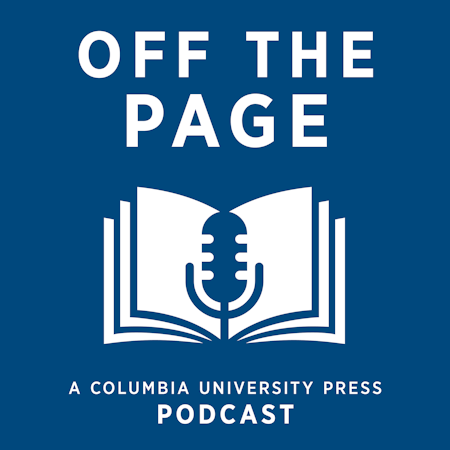
Off the Page: A Columbia University P...
Interviews with Columbia University Press authors.
326
Paige Glotzer, "How the Suburbs Were Segregated...
Glotzer examines the history surrounding how modern housing segregation was purposefully planned out beginning at the turn of the 20th Century...
53 min
327
M’hamed Oualdi, "A Slave between Empires: A Tra...
Oualdi explores the life and afterlife of one figure, the manumitted slave and Tunisian dignitary Husayn Ibn ‘Abdallah...
38 min
328
Noëlle McAfee, "Fear of Breakdown: Psychoanalys...
In his classic essay on the fear of breakdown, Donald Winnicott famously conveys to a patient that the disaster powerfully feared has, in fact, already happened...
54 min
329
Dominik Finkelde, "Excessive Subjectivity: Kant...
How are we to conceive of acts that suddenly expose the injustice of the current order?
74 min
330
V. Hudson, D. Bowen, P. Nielsen, "The First Pol...
The authors show that when steps are taken to reduce the hold of inequitable laws, customs, and practices, outcomes for all improve....
96 min
331
Todd McGowan, "Emancipation After Hegel: Achiev...
McGowan combines sophisticated discussion of matters like the limits of formal logic and the history of German Idealism with playful allusions to Star Trek characters and classic films like Casablanca and Bridge on the River Kwai...
50 min
332
Ruth Palmer, "Becoming the News: How Ordinary P...
Palmer argues that understanding the motivations and experiences of those who have been featured in news stories – voluntarily or not – sheds new light on the practice of journalism and the importance many continue to place on the role of the mainstream media...
56 min
333
Tania Jenkins, "Doctors’ Orders: The Making of ...
Jenkins engages readers in readers in a ethnography where she spent years observing and interviewing American, international, and osteopathic medical residents in two hospitals...
48 min
334
Diana Lemberg, "Barriers Down: How American Pow...
Since the 1940s, America’s relations with the rest of the world have been guided by the idea of promoting the free flow of information...
46 min
335
L. Benjamin Rolsky, "The Rise and Fall of the R...
Rolsky makes the case for understanding Norman Lear as a key protagonist in the culture wars of the late 20th century...
59 min
336
Adrian Johnston, "A New German Idealism: Hegel,...
Johnston traces the development of Žižek's recent thought in detail, salvaging the key philosophical themes while also offering several criticisms and developments of his own...
115 min
337
Anna M. Gade, “Muslim Environmentalisms: Religi...
The relationship between Islam and the environment has a long and rich history across various Muslim societies...
52 min
338
Leor Halevi, "Modern Things on Trial: Islam’s G...
How did Muslims respond to foreign goods in an age characterized by global exchange and European imperial expansion?
50 min
339
Evan Friss, "On Bicycles: A 200-Year History of...
Friss historicizes the bicycle’s place in New York City’s social, economic, infrastructural and cultural politics...
46 min
340
Sandra Fahy, "Dying for Rights: Putting North K...
Fahy gives a thorough and compelling analysis of testimonies and reports on North Korea...
47 min
341
Hunter Vaughan, "Hollywood’s Dirtiest Secret: T...
Vaughan offers a new history of the movies from an environmental perspective...
61 min
342
Philip M. Napoli, "Social Media and the Public ...
"Social Media and the Public Interest" approaches this complex and multi-layered issue from a host of perspectives, leading the reader into the broader discussion through a history of social media,..
44 min
343
James Gordon Finlayson, "The Habermas-Rawls Deb...
Finlayson traces their dispute from its inception in their earliest works to the 1995 exchange and its aftermath, as well as its legacy in contemporary debates...
121 min
344
Dana Fisher, "American Resistance: From the Wom...
"American Resistance" follows activists from the streets back to their congressional districts around the country...
25 min
345
Benjamin Fong, "Death and Mastery: Psychoanalyt...
Fong revitalizes two oft’ maligned psychoanalytic concepts, the death drive and the drive to mastery...
65 min
346
Wendy Brown, "In the Ruins of Neoliberalism: Th...
Neoliberalism is one of those fuzzy words that can mean something different to everyone...
40 min
347
Perin Gürel, "The Limits of Westernization: A C...
In a 2001 poll, Turks ranked the United States highest when asked: "Which country is Turkey's best friend in international relations?"
34 min
348
Geoffrey Barstow, "Food of Sinful Demons: Meat,...
Barstow explores the tension between Buddhist ethics and Tibetan cultural norms to offer a novel perspective on the spiritual and social dimensions of meat eating...
62 min
349
Andrew Sidman, "Pork Barrel Politics: How Gover...
Sidman offers a systematic explanation for how political polarization relates to the electoral influence of federal spending...
20 min
350
Elizabeth Herbin-Triant, "Race, Class, and Camp...
Threatening Property examines the campaigns for residential segregation in early-20th century North Carolina...
35 min